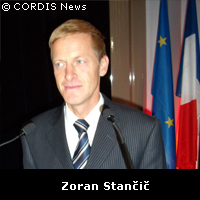Climate change: the quiet science speaks up
When buying an electrical appliance, most people are familiar with the 'A', 'B', 'C' or 'D' energy efficiency labelling system. This clever idea spells out which appliances are both likely to save the consumer money and be gentler on the environment, and may even influence the purchase made. Social behaviour, particularly as it affects other areas such as economics and natural resources, is at the heart of the social sciences and humanities. These so-called 'soft sciences' took centre stage this week at the start of a two-day conference organised by the French Presidency of the European Union, where the message delivered was loud and clear: the social sciences have an essential role to play in predicting and addressing the changes that are taking place on the planet. The concept of ranking appliances has had an enormous impact on understanding the real price of energy, explained Domenico Rossetti, Principal Administrator of the Science, Economy and Society Directorate at the European Commission's Directorate-General for Research. 'If you speak in terms of kilowatt hours per year, nobody understands, but if you put an A, B, C, or D everyone understands easily,' he explained. When it comes to electricity, consumers do not know what they are spending, as they do, for example, when they fill up their car tank with petrol. Electricity bills in some countries are generated monthly; in other countries they are issued quarterly or even once a year, sometimes as estimates. 'When you put EUR 70 of gasoline or diesel in your car, you immediately see it. In electricity consumption, which is a very important issue and will increase a lot in the next 20 to 30 years, most people have no idea what they are spending daily or weekly,' Mr Rossetti told CORDIS News. If an electrical meter in a kitchen or bathroom at home could show a person how much they were consuming daily and its cost, perhaps they would be inclined to turn off their lights more often. The idea described by Mr Rossetti may not be as far from reach as one might expect. As part of the European Commission's 'Research in the economic, social sciences and humanities - prospective' unit, Mr Rossetti and his colleagues oversee research into the issues that will have an impact on Europe and the rest of the world in the medium and long-term future, such as forecasts for the years 2050 and 2100. This unit supports the aims of the Socio-economic Sciences and Humanities (SSH) Programme, one of the key themes of the Seventh Framework Programme (FP7). Although the EU has consistently funded SSH research in previous programmes, it is the first time an entire theme has been dedicated to research in this way. An impressive budget of more than EUR 600 million has been allocated to the SSH Programme during FP7's seven-year duration (2007-2013). Additionally, most of the FP7 thematic programmes have a socio-economic component, and the European Research Council also commits part of its budget to SSH activities. This support is indicative of the important contribution the social sciences make in dealing with problems such as costs and pricing, human behaviour and trends associated with future, global challenges. The issues of climate change and sustainable development, however, are relatively new topics in SSH, Mr Rossetti pointed out. They play a central role in what has been coined a 'post-carbon society', referring to the desired shift towards more efficient energy use and the development of technologies that will generate less greenhouse gas emissions. 'It is present in different themes of the Framework Programme, such as energy, environment, and transport, but in SSH it is relatively new to have in-depth, multidisciplinary research dealing with this issue, both among and between the sciences,' he commented. Unlike the so-called 'hard sciences' that are technology-orientated, SSH draws on the fields of economics, sociology, political science, anthropology, history and philosophy to generate the knowledge that will lead to new ways of tackling socio-economic issues related to resource depletion, greenhouse gas emissions, nuclear waste, and the security of energy supply. The exchange of information between stakeholders working on these fundamental challenges is one of the main objectives of the conference being held in Paris, France, at the Maison de la Chimie. The European Commission's Deputy Director for Scientific Advances, Zoran Stancic, noted that the choice of venue for the conference (Maison de la Chimie means Chemistry House) is a fitting symbol of the need to inspire more dialogue between the social and natural sciences. 'Today's issues of climate change and energy are very complex, therefore we will be able to find proper answers only if we work together,' he stated. The EU has three key targets for the year 2020: to reduce greenhouse gas emissions by 20% (with respect to 1990 levels), increase energy efficiency by 20%, and reach a share of 20% of renewable sources (against the current 7%). Additionally, the European Council is committed to limiting the global temperature rise to 2°C. 'In order to achieve these ambitious goals we can not rely only on technological solutions,' Mr Stancic explained. 'It's very important to have also all other aspects of the society in mind.' Technology can, for example, provide the means for more efficient car engines, but simply by convincing drivers to reduce their speed by 20 kilometres per hour can generate remarkable savings in energy and emissions. The conference is hosted by the French Presidency of the European Union, the French Ministry of Higher Education and Research, the French Ministry of Ecology and Sustainable Development, and the Directorate-General of Research of the European Commission.
Countries
France



